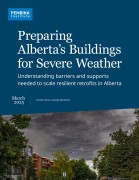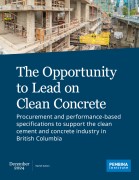The Pembina Institute has sent a letter to Vancouver mayor Gregor Robertson and city councillors regarding the Zero Emissions Building Plan, which is scheduled to go to council this week:
June 11, 2016
Mayor Gregor Robertson and City Council
453 West 12th Avenue
Vancouver, BC V5Y 1V4
mayorandcouncil@vancouver.ca
Dear mayor and council:
Re: Zero Emissions Building Plan
The Zero Emissions Building Plan up for consideration by your council represents a key opportunity for the City of Vancouver to reassert the bold climate leadership that has become its signature. This decision comes at a critical time. Governments at all levels are crafting plans to curb carbon emissions in light of the renewed global commitment in Paris and the Vancouver Declaration on Clean Growth and Climate Change signed by Canada’s first ministers in March.
The Pembina Institute applauds the vision, commitment and adaptiveness of the City of Vancouver on climate action. Vancouver has consistently demonstrated environmental leadership in the building sector and is recognized as one of North America’s leading jurisdictions in this area, due in part to the success of the Green Buildings Policy for Rezonings and the General Policy for Higher Buildings. The Zero Emissions Building Plan will build on this success and accelerate the market transformation already underway in the city.
We wholeheartedly support the Zero Emissions Building Plan, and we see it as an important milestone on the path to an ultra energy-efficient, low-carbon economy. The plan is ambitious and — given the city’s progress to date and access to clean energy — achievable. The plan represents a pragmatic approach to climate action, because of comprehensive consultation with a multitude of stakeholders within the building sector, including the Pembina Institute. This engagement has resulted in a sensible and grounded approach. It has also allowed the city to give early indications of its intentions with defined goals and a timeline. Certainty gives the marketplace time to adapt and innovate.
As described in the proposal, this plan has been informed by and builds on lessons from other jurisdictions, such as the City of New York and Belgium’s Brussels–Capital Region. The vision and commitment of the Brussels government enabled the region to transform its building stock in less than a decade so it’s now among the world’s most energy efficient. A pivotal step was requiring all new construction and retrofits to meet passive house standards. With the Zero Emissions Building Plan, the City of Vancouver also has an opportunity to be at the forefront with respect to energy efficiency in buildings: Vancouver will become the first city in North America with a roadmap for eliminating emissions from most new homes and buildings by 2025.
This Zero Emissions Building Plan is a robust strategy, laying out the clear goals and critical supporting initiatives needed to encourage transformation in the building sector through targeted funding and capacity building. The creation of the Zero Emission Building Centre of Excellence will allow for the dissemination of knowledge and lessons learned during the implementation of the plan. In addition to reinforcing Vancouver’s efforts, this centre of excellence will serve as an important resource for other jurisdictions.
The planned reduction of emissions and energy use by Vancouver’s homes and buildings will result in co-benefits. These include improvements to the quality of the homes and buildings in which Vancouver residents live and work, the creation of green jobs and increased innovation in the supply chain.
The zero-emissions approach represents an important evolution in Vancouver’s Greenest City 2020 Action Plan. Pursuing solely carbon neutrality will not result in the magnitude of reductions in the time frame we have to meet our national and international climate targets. Simply put, we need to look for all opportunities to reduce consumption of fossil fuels as quickly as possible. The Zero Emissions Building Plan will become a model for many other jurisdictions in Canada and North America.
The Pembina Institute appreciates the effort that has been made in developing the Zero Emissions Building Plan and encourages its adoption. As other governments wrestle with how best to make good on our global commitment to reduce carbon pollution and take strong climate action, Vancouver continues to forge ahead.
Yours sincerely,
Karen Tam Wu
Director, Buildings and Urban Solutions Program
Pembina Institute








